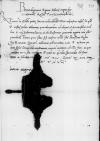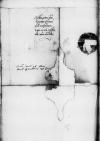List #626
Bona Sforza do Ioannes DANTISCUSCracow (Kraków), 1531-05-16
| odebrano Ghent (Gandavum), [1531]-06-29 Rękopiśmienne podstawy źródłowe:
Publikacje:
| ||||||
Tekst + aparat krytyczny + komentarz Zwykły tekst Tekst + komentarz Tekst + aparat krytyczny
Reverendo in paper damaged⌈[Reverendo in]Reverendo in paper damaged⌉ Christo Patri, domino Ioanni Dantisco paper damaged⌈[
Reverende in Christo Pater, sincere nobis dilecte.
Etsi ad praesens nihil sit, quod Paternitati Vestrae scribere
debeamus, quandoquidem ab aliquot iam fere mensibus nullas Paternitatis Vestrae habuimus litteras et ob id nescimus, quomodo negotia nostra istic procedant, tamen cum istuc sese conferre vellet iste
Bene ac feliciter valeat paper damaged⌈[eat]eat paper damaged⌉ Paternitas Vestra.
Dat(ae) or Dat(um)⌈Dat(ae)Dat(ae) or Dat(um)⌉


 BCz, 3465, p. 194
BCz, 3465, p. 194